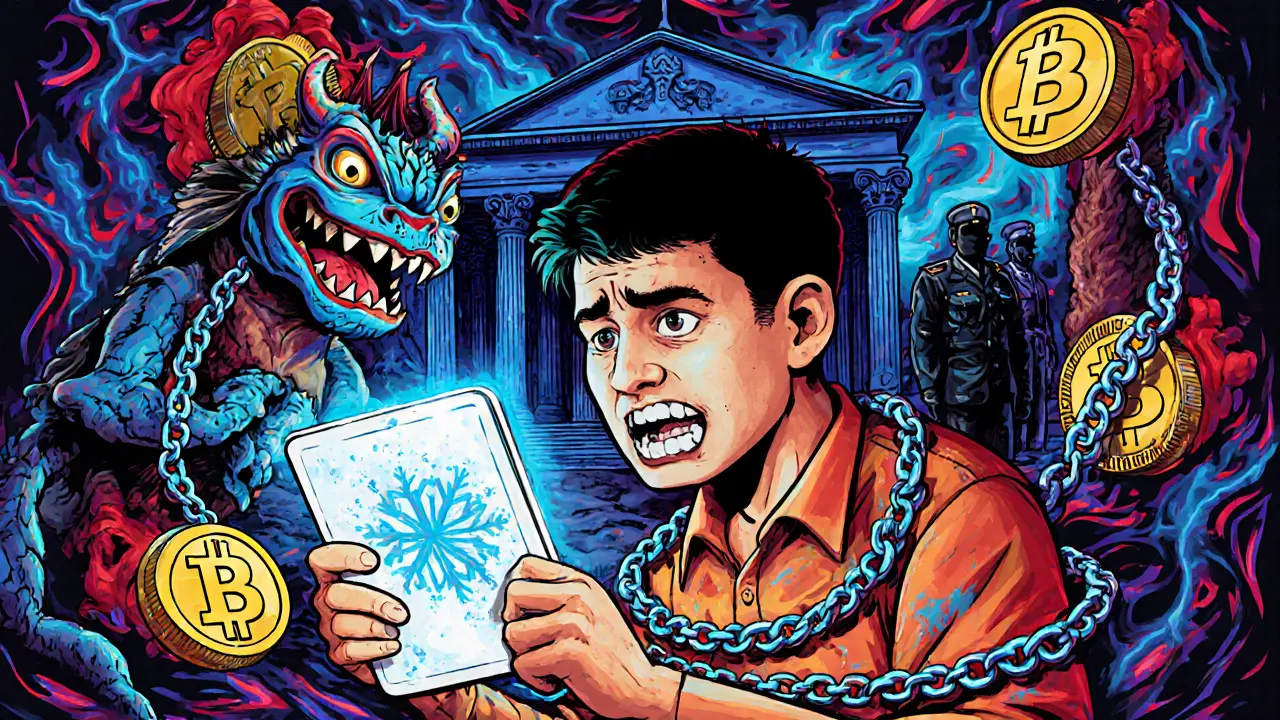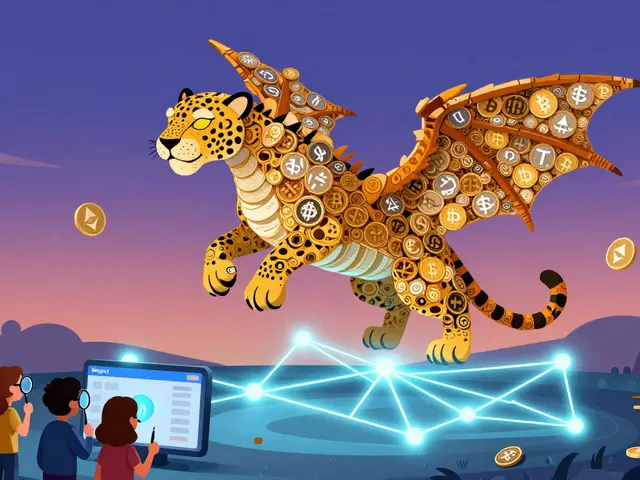If you’re using Bitcoin, Ethereum, or USDT in Myanmar, your bank account could be shut down tomorrow - no warning, no appeal. This isn’t a hypothetical risk. It’s happening right now.
Myanmar’s Crypto Ban Is Not a Warning - It’s Enforcement
Myanmar’s Central Bank (CBM) doesn’t just dislike cryptocurrency. It treats it like a crime. Since 2020, the CBM has said trading crypto is “at your own risk.” But in May 2024, everything changed. They issued a public notice: stop using digital currencies, or we’ll close your bank account and take you to court. This wasn’t just a reminder. It was a declaration of war. The CBM started shutting down accounts immediately. People who bought Bitcoin on Binance, sold USDT on Telegram, or mined crypto from their homes found their savings frozen overnight. No explanation. No refund. Just silence from the bank. The legal basis? Three laws: the Central Bank of Myanmar Law, the Anti-Money Laundering Law, and the Financial Institutions Law. Together, they make any crypto transaction - buying, selling, mining, even receiving payment - a criminal act. The CBM doesn’t need a court order to close an account. They do it themselves. And they’re not alone. The military government backs them fully.What Happens When Your Account Gets Closed?
Losing your bank account in Myanmar isn’t like losing access to an app. It’s like losing your financial life. You can’t pay bills. You can’t receive salary. You can’t send money to family. If you’re a small business owner, your suppliers stop responding. If you’re a student, your tuition payments bounce. If you’re trying to send money to relatives abroad - a common need in a country where the kyat has lost over 60% of its value since 2021 - you’re suddenly cut off from the only tools that worked. The CBM doesn’t just freeze the account. They flag your name in the national financial database. That means even if you open a new account later, the bank will see the red flag and refuse you. You’re blacklisted. And if you try to use cash to move money, you risk being accused of “hundi” - illegal money transfer - which carries its own penalties. Some people have been arrested. In 2024, a group in Mandalay was taken into custody after police traced USDT transfers through their Facebook pages. They spent weeks in jail before being released on bail, but their accounts were never reopened. Their businesses collapsed. Their credit was destroyed.Penalties Go Beyond Bank Accounts
Account closure is just the start. The real fear is prison. Under Myanmar’s Anti-Money Laundering Law, engaging in cryptocurrency transactions can lead to up to five years in jail. Fines can reach millions of kyat - far more than most people earn in a year. The CBM doesn’t just target big traders. They go after students, housewives, and shop owners who used crypto to save money or pay for imports. The CBM specifically named Bitcoin (BTC), Ethereum (ETH), Litecoin (LTC), and Perfect Money (PM) as illegal. But they’ve focused most on Tether (USDT). Why? Because USDT is stable. It’s used to bypass currency controls. It’s the backbone of the underground economy. And that’s exactly what the junta wants to crush. Even if you don’t trade yourself, helping someone else trade - like running a Telegram group that connects buyers and sellers - can get you arrested. The law doesn’t care if you’re “just a facilitator.” You’re still guilty.Underground Crypto Is Booming - But It’s Dangerous
Despite the risks, crypto use hasn’t disappeared. It’s gone deeper. In Yangon, people meet in coffee shops to swap USDT for cash. In Mandalay, miners run rigs in back rooms, hidden behind false walls. In Shan State, traders use encrypted apps like Signal and Telegram to move money across borders. The Tron network, because it’s cheap and fast, has become the preferred chain for USDT transfers. These aren’t tech-savvy elites. These are ordinary people. A nurse in Naypyitaw uses USDT to pay for her brother’s medical treatment abroad. A farmer in Kayin State sells rice to a buyer in Thailand and gets paid in USDT because the kyat is worthless. A student in Mawlamyine uses crypto to get textbooks from overseas. But every transaction is a gamble. A single screenshot of a chat message can be used as evidence. A bank teller might report suspicious activity. A neighbor might turn you in. The state has informants everywhere.
The Junta’s Digital Kyat Is Coming - And It’s Not for You
In June 2025, the CBM formed the Central Committee for the Issuance of Central Bank Digital Currency. This group, led by the CBM Governor and top military officials, is building a government-controlled digital kyat. This isn’t about innovation. It’s about control. The junta wants to track every payment, freeze any account at will, and eliminate cash alternatives. Their digital currency won’t give you freedom. It will give them more power. Meanwhile, the National Unity Government (NUG), which opposes the junta, declared USDT legal tender in areas they control. That means in parts of northern Myanmar, using crypto is seen as resistance. In other parts, it’s a crime. You could be a hero in one town and a criminal in the next.Why Is Myanmar So Harsh on Crypto?
The answer is simple: fear. After the 2021 coup, the military lost control of the economy. The kyat collapsed. Inflation hit 50%. People stopped trusting banks. Crypto became the only way to save money, pay for imports, or send remittances. The junta couldn’t stop it with force - so they turned to financial terror. They know crypto undermines their power. If people can move money outside the system, they can fund opposition groups. They can bypass sanctions. They can survive without the state. The crackdown isn’t about money laundering. It’s about control. The CBM doesn’t care if you’re a criminal. They care that you’re independent.What Should You Do If You’re in Myanmar?
If you’re using crypto, stop. Immediately. Don’t wait for a warning. Don’t think “it won’t happen to me.” It already happened to thousands. The CBM isn’t bluffing. They’ve closed over 1,200 accounts since May 2024, according to leaked internal reports. If you have crypto in an exchange, move it to a personal wallet - but don’t trade it. Don’t send it. Don’t cash out. Just hold it. And prepare for the worst. If you’re thinking about starting to use crypto - don’t. The risks aren’t worth it. Even if you think you’re smart enough to hide it, the system is designed to catch you. The only safe path is to avoid crypto entirely until the political situation changes. And that could take years.
What About Miners and Exchanges?
Crypto miners used to be common in Myanmar. Cheap electricity, low regulation - it was ideal. Now, most have fled. Thailand, Laos, and Kazakhstan are seeing a surge in Myanmar-based miners setting up shop. Local exchanges? They’re gone. Most shut down in 2023. A few operate in secret, but they’re ghost operations. No customer support. No refunds. No legal protection. If you lose money, you lose everything. Even if you’re not trading, if you’re mining, you’re at risk. Authorities have raided homes with hidden servers. They’ve seized computers, phones, and hard drives. They’ve charged people with “illegal financial activity.”Who’s Really Affected?
This isn’t just about crypto traders. It’s about everyone. Families who rely on remittances from overseas. Small businesses that use crypto to buy tools from China. Doctors who pay for medicine through digital channels. Students who use crypto to access online education. The ban doesn’t just punish criminals. It punishes survival. And yet, the junta doesn’t care. They’ve chosen control over compassion. They’ve chosen power over people.Final Reality Check
Crypto in Myanmar isn’t a financial tool anymore. It’s a political act. Using it means risking your bank account. Your freedom. Your future. There’s no gray area. No middle ground. The law is absolute: no crypto, no exceptions. If you’re reading this and you’re in Myanmar - your next move could define your next five years. Choose carefully.Is it illegal to own cryptocurrency in Myanmar?
Yes. Simply holding cryptocurrency - even if you never trade it - can be considered illegal under Myanmar’s financial laws. The Central Bank of Myanmar treats possession of unregulated digital assets as a violation of currency control rules. If authorities find crypto in your wallet or on your device during a raid, it can lead to account closure, fines, or arrest.
Can I use USDT to send money out of Myanmar?
Technically, yes - many people do. But legally, no. Sending USDT out of Myanmar is considered illegal currency conversion under the Foreign Exchange Management Law. The CBM actively monitors peer-to-peer transfers on Telegram and Facebook. If caught, you risk account closure, fines up to millions of kyat, and possible imprisonment under the Anti-Money Laundering Law.
What happens if I’m caught mining crypto in Myanmar?
If you’re caught mining cryptocurrency, authorities will seize your equipment - computers, GPUs, mining rigs - and may charge you with illegal financial activity. You could face a fine, imprisonment of up to five years, or both. Many miners have been arrested during raids on homes and rented spaces. Even running a single miner in your bedroom is enough to trigger a crackdown.
Are there any legal crypto exchanges in Myanmar?
No. There are no legal crypto exchanges operating in Myanmar. All domestic exchanges were shut down by 2023. Any platform claiming to be a “Myanmar crypto exchange” is either a scam or an illegal operation. Using them puts you at high risk of being tracked, fined, or arrested by the Central Bank of Myanmar.
Can I open a new bank account after mine was closed for crypto use?
It’s extremely difficult. Once your account is closed for crypto activity, your name is flagged in the CBM’s national financial database. Most banks will refuse to open a new account for you, even years later. Some people try using family members’ names, but this is risky and can lead to legal trouble for them too.
Why does Myanmar allow a digital kyat but ban Bitcoin?
The digital kyat is a government-controlled currency. The junta wants to track every transaction, freeze accounts instantly, and eliminate financial independence. Bitcoin and USDT are decentralized - they can’t be controlled. The digital kyat gives the state more power. Bitcoin gives people freedom. That’s why one is allowed and the other is banned.
Is it safe to use crypto if I live in a rebel-controlled area?
In areas controlled by the National Unity Government (NUG), using USDT is technically legal - they declared it legal tender in 2021. But if you travel to junta-controlled areas, carry crypto, or send money across borders, you risk arrest. The laws change depending on who controls the region. There’s no nationwide safety.
What should I do if my account was already closed for crypto?
There is no formal appeal process. The CBM does not reverse account closures for crypto violations. Your best option is to stop all crypto activity immediately, avoid using any digital wallets, and rely on cash or trusted intermediaries for transactions. Consider relocating if possible. Legal help is nearly impossible to find - most lawyers won’t take these cases.










